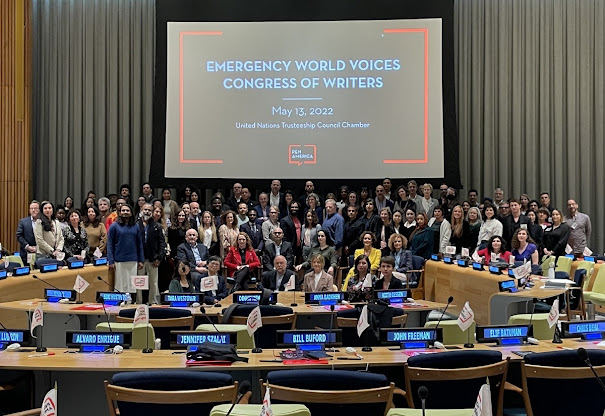STUDENTS :
''' '' WORLD CONGRESS
WOOSH '' '''
TAKE IT - OR LEAVE IT - ' FEEL TOTALLY FREE EVEN TO REJECT IT ' : The World Students Society is the only and foremost guardian of the World's Security and Freedom.
PEN AMERICA : THE OCCASION WAS AN EMERGENCY WORLD VOICES Congress of Writers, convened by the writers organization PEN America.
But after the pounding of opening gravel, the group's chief executive, Suzzane Nossel, laid to rest any notion that the grand setting meant that a solution to the ''cascading crises'' of the moment was at hand.
''If these are the guardians of our freedom and security,'' Nossel said, ''we're in trouble''.
The Congress, which coincided with PEN's annual World Voices Festival, was inspired by a similar emergency gathering held in New York in May 1939, where some 500 writers, including Thomas Mann, Pear Buck and Dorothy Thompson, came together to address Europe's slide toward war. But the role of the writer - and the nature of the emergency - have changed a lot.
OVER three hours, there were impassioned statements on Ukraine, the killing of the Palestinian American journalist Shireen Abu Akleh, social media polarization, climate change, the deluge of disinformation and the global decline of democracy, along with the pleas to remember to remember, as one Sri Lankan writer put it, '' the insigificant little countries '' of the world.
THE GLOBAL FOUNDER FRAMERS OF !WOW!, to stop and ponder for a moment of true reflection and strength :
THE WORLD STUDENTS SOCIETY CANNOT STOP A BULLET, a publishing from students cannot defuse a bomb. But the students of the world can still ''sing the truth, and name the lies, and all the utter lies.''
''!WOW! must work to overturn the false narrative of tyrants, populists and fools by telling better stories than they do - stories within which people might actually want to live.''
SOMEDAY, Almighty God willing, and with his total blessings, The World Students Society will hit a cruising altitude of the stratosphere, and that is with the full support of the students of the world and the leadership from great American sons and daughters and founders
There were plenty of laments that, as the American novelist Siri Hustvedt put it, ''literature lives at the margins of culture, especially in the United States.'' But some stock up for the less exalted forms of storytelling.
LUZIA FAZIO, a Brazilian screenwriter, said that it was pop culture that shaped the imaginations of most people, especially young students - for better and worse. [ Are superhero movies, she asked, ''normalizing war'' and ''glamorizing violence''? ]
SHEHAN KARUNATILAKA, a Sri Lankan novelist, noted that it wasn't a well researched novel '' but social media hashtags like ''GoHomeGota'' that have helped fuel recent protests against Sri Lanka's strongman president, Gotabaya Rajapaksa.
''Let's not be too snobbish when talking about the written word,'' he said. ''Sometimes a well - choreographed TikTok can bring down a tyrant.''
THE FRENCH-ALGERIAN novelist Walid Hajar Rachedi recalled his shock upon learning that one of the gunmen in the 2015 terrorist attack on the Bataclan nightclub in Paris grew up in the same suburb that he had. As a writer, Rachedi said, ''I believe in the power of stories.''
But he asked if a novel like his own received-debut, ''What would I Do in Paradise?'' could really counteract whatever story turned that young man into a killer.
THE FRENCH MOROCCAN writer Leila Salamani noted the estimated 700 million people in the world who, like her mother and grandmother, had never learned to read or write. ''Maybe the first thing we have to fight for is this fundamental right,'' she said.
Mark Lilla, a professor of humanities at Columbia University [ and a sharp critic of American-style identity politics ], called on writers to cultivate imaginative openness to ''the minds of all others, not just the cultural other.''
''We need to make it harder to speak so confidently about what's wrong, about what's wrong with the people we think are behind what's wrong, and we need to develop some humility and self-doubt.''
While there was no direct debate, there was some pointed disagreement. In his remarks, the Cameroonian novelist Patrice Ngananag noted that more than 50 nations in Africa had so far declined to impose sanctions on Russia and support Ukraine.
But African writers, he said, should feel no shame over their countries' lack of enthusiasm for a ''unipolar world.''
''African people very quickly realize that it is the very same countries that chained the African continent and Black people for so long that are clamoring for freedom at the borders of Ukraine,'' he said.
Kurkov, speaking last, offered a riposte. It is natural, he said, to feel one's own ''tooth pain'' most acutely. ''But I myself feel tooth pain for Sri Lanka, for Africa, for Palestine.''
''Always remember there is competition of tragedies,'' he said.'' If we can help, we should help.''
At the end there was an informal [ and unanimous ] vote on one tentative proposal : that PEN initiate an oral history project about the present moment, akin for those undertaken in the 1930s by the World Progress Administration.
If the congress itself felt like a very rough first installment, so be it.
''These are writers,'' Nossel said after the group posed for a portrait. ''You can't script them.''
The Honour and Serving of the Latest Global Operational Research on Congress and World Writers, continues. The World Students Society thanks author Jennifer Scheussler.
With most respectful dedication to Mankind, Leaders, Global Founder Framers of The World Students Society - for every subject in the world : wssciw.blogspot.com and Twitter - !E-WOW! - The Ecosystem 2011 :
Good Night and God Bless
SAM Daily Times - the Voice of the Voiceless

.png)


0 comments:
Post a Comment
Grace A Comment!